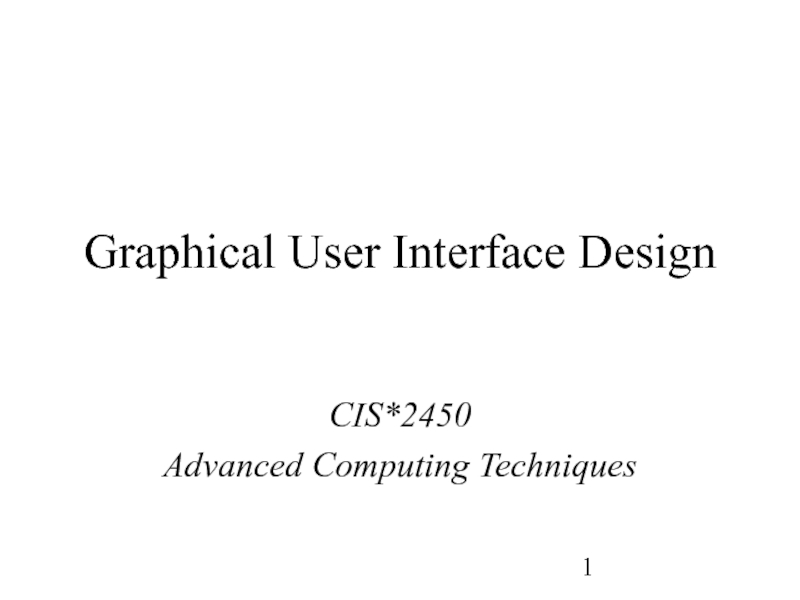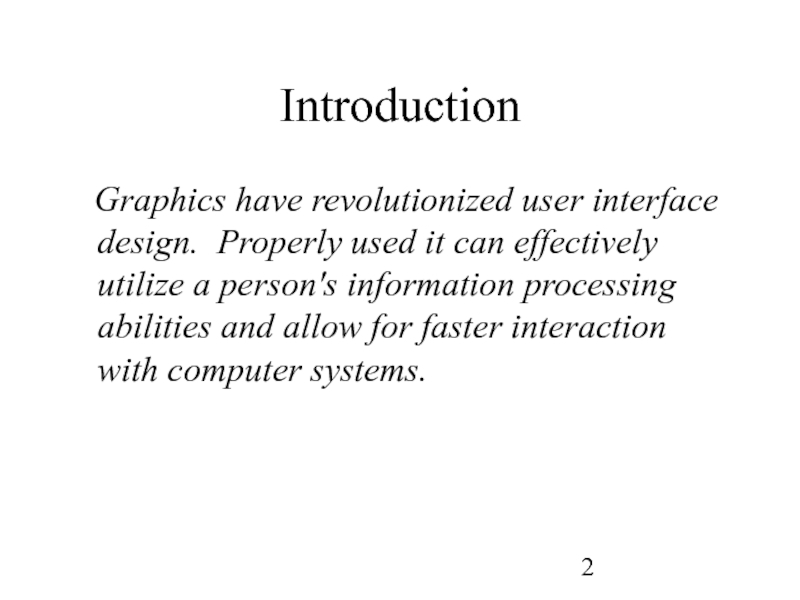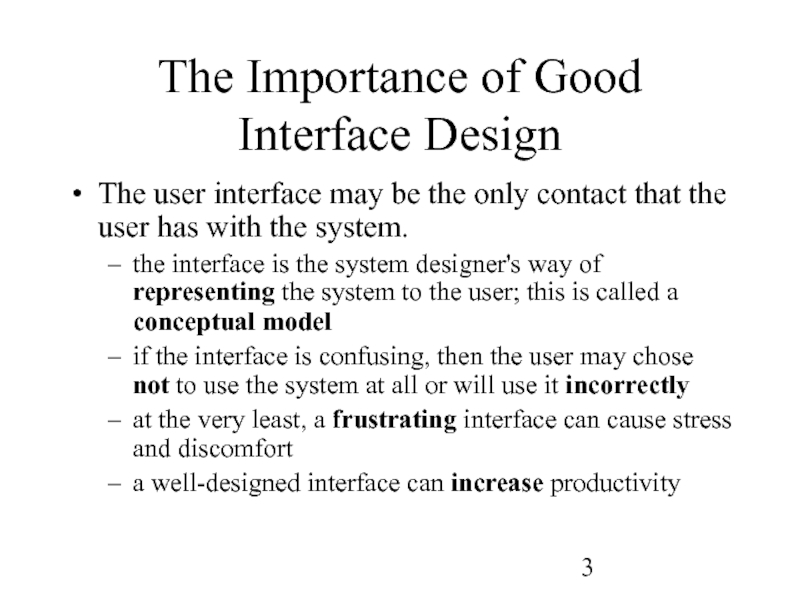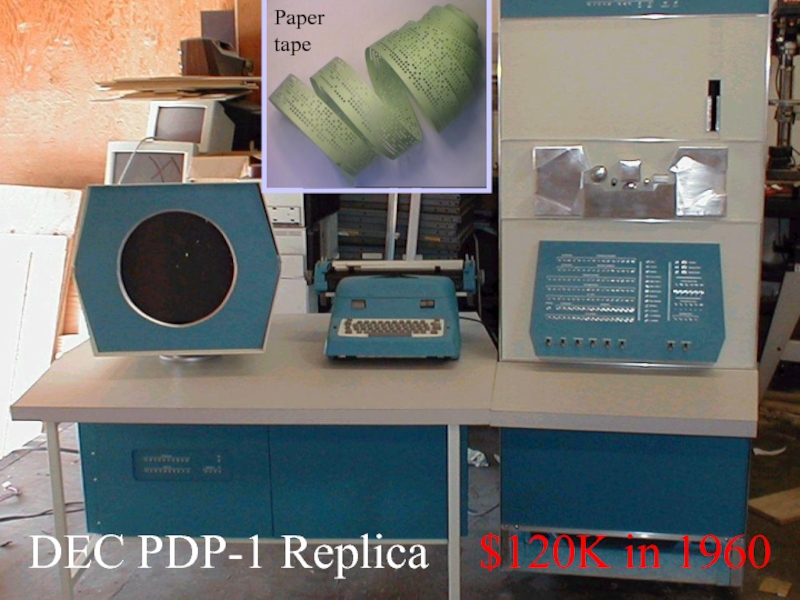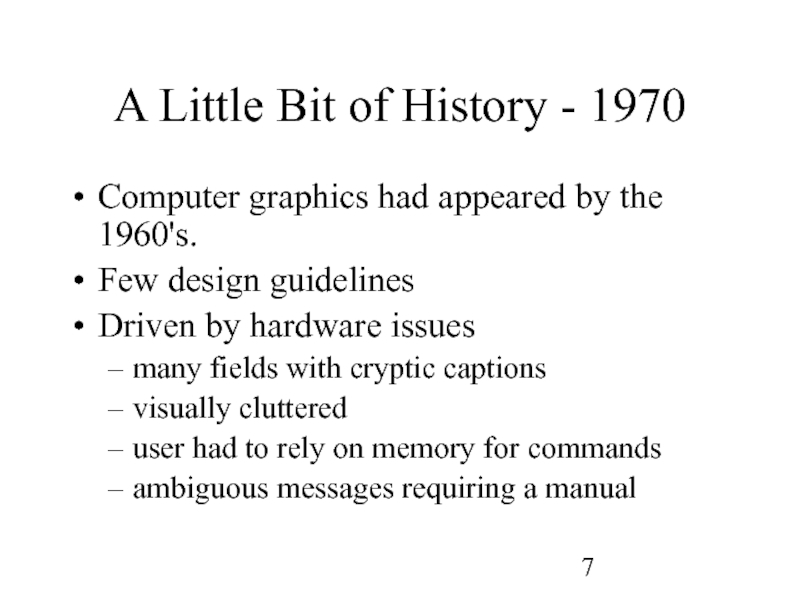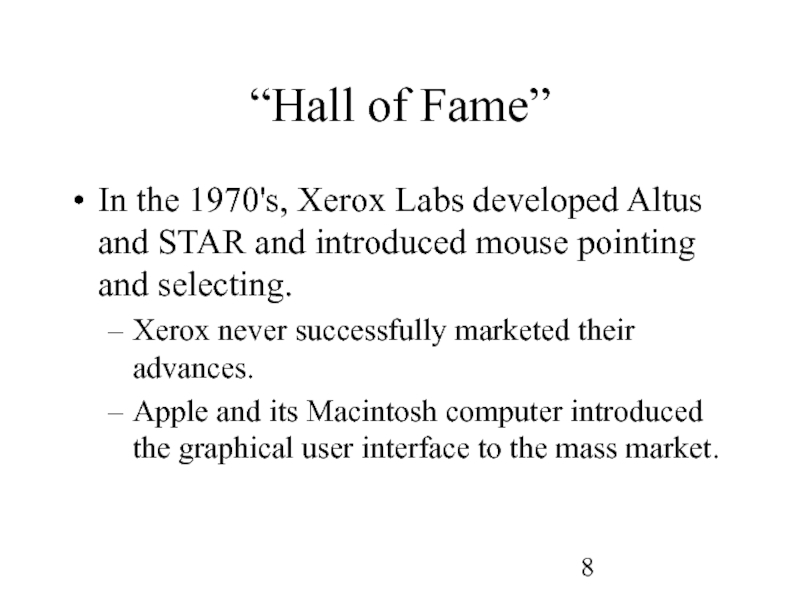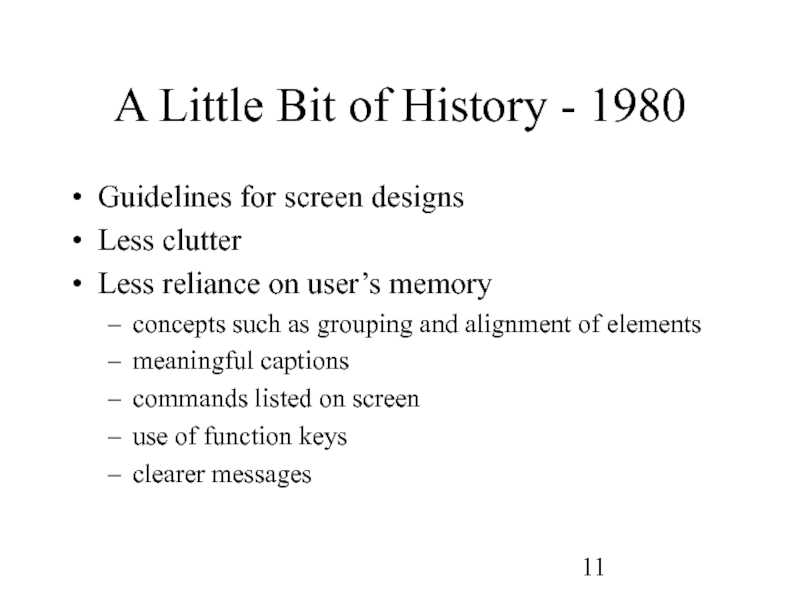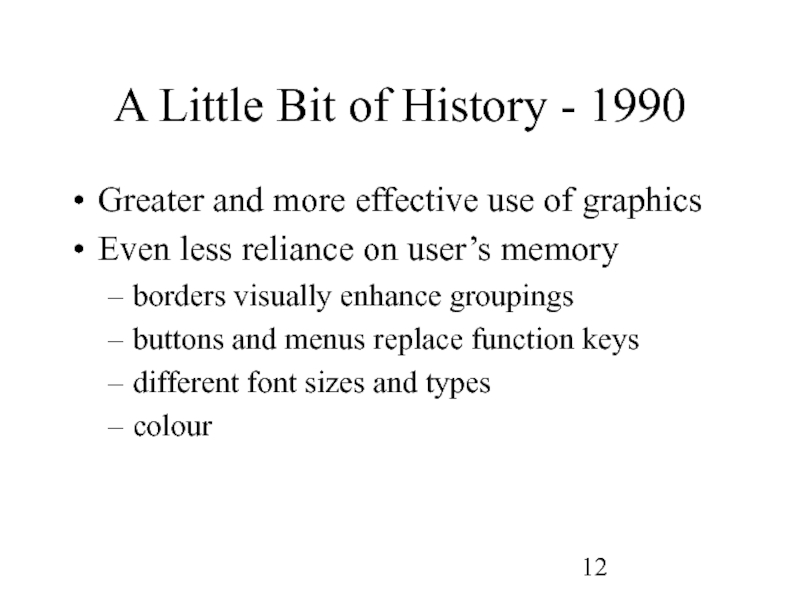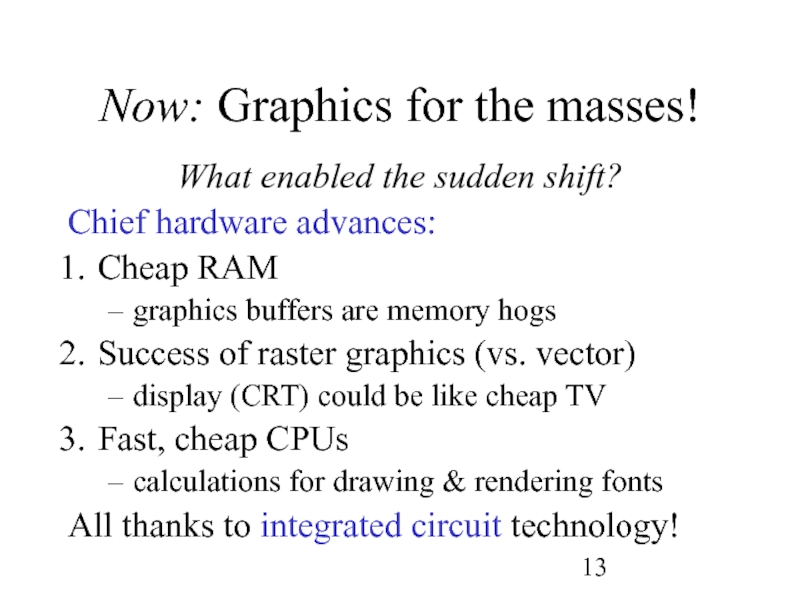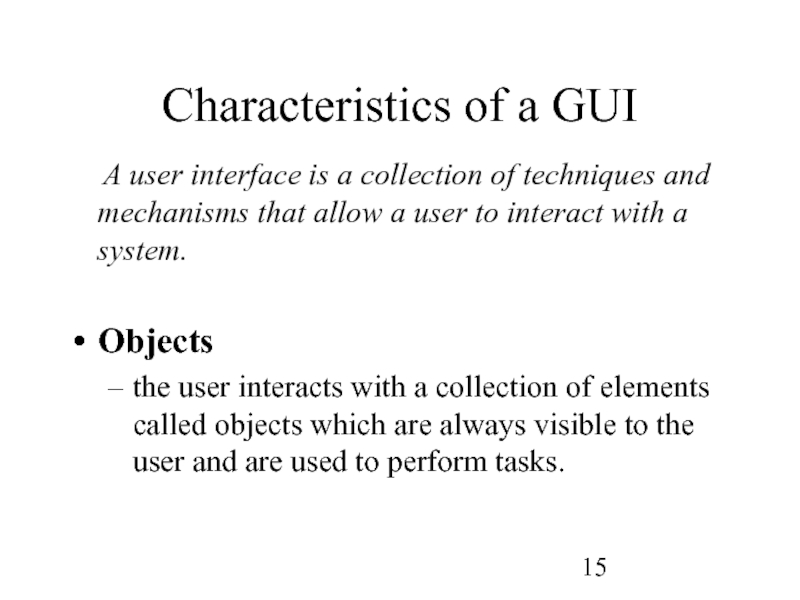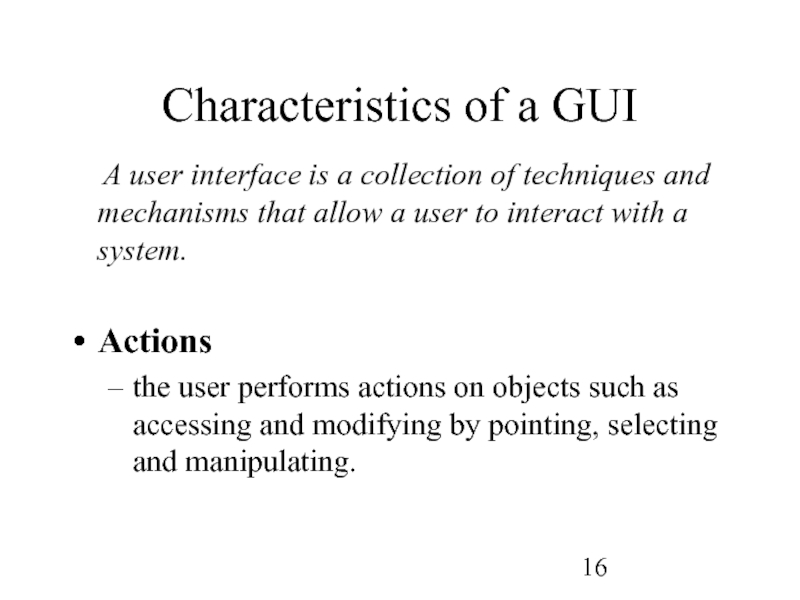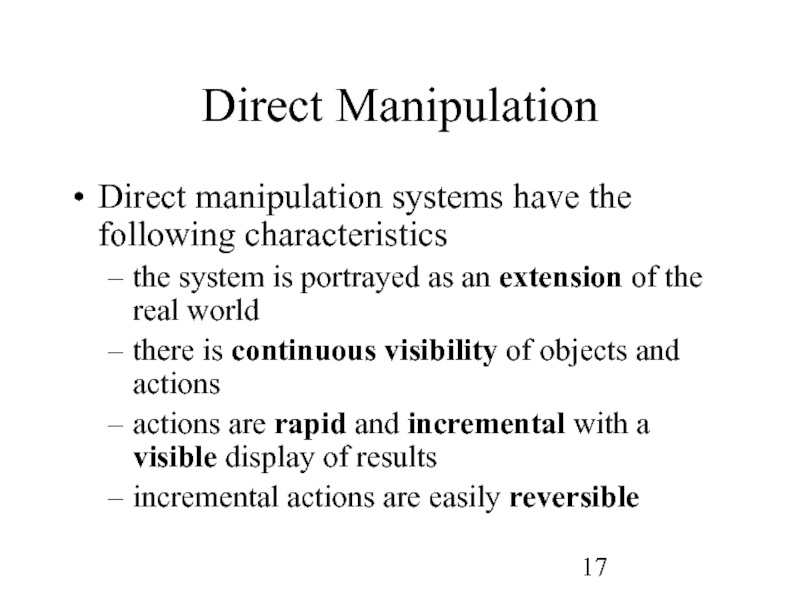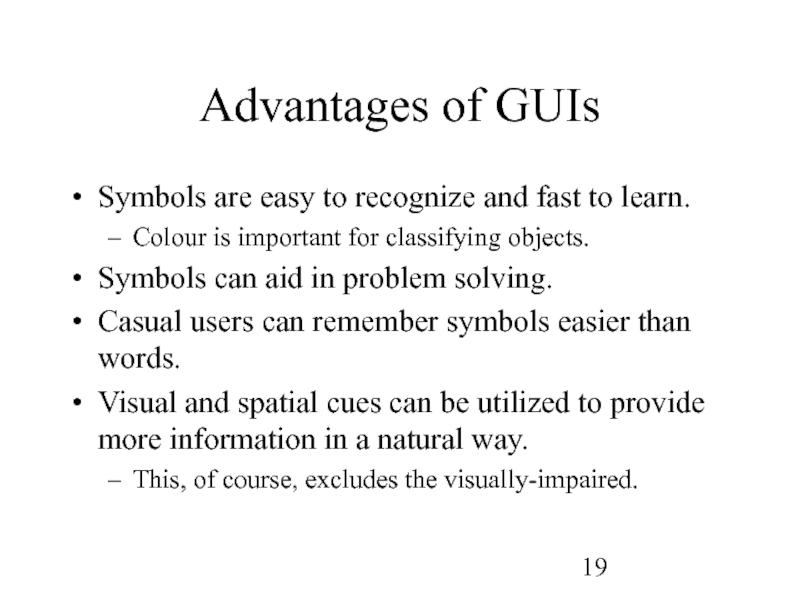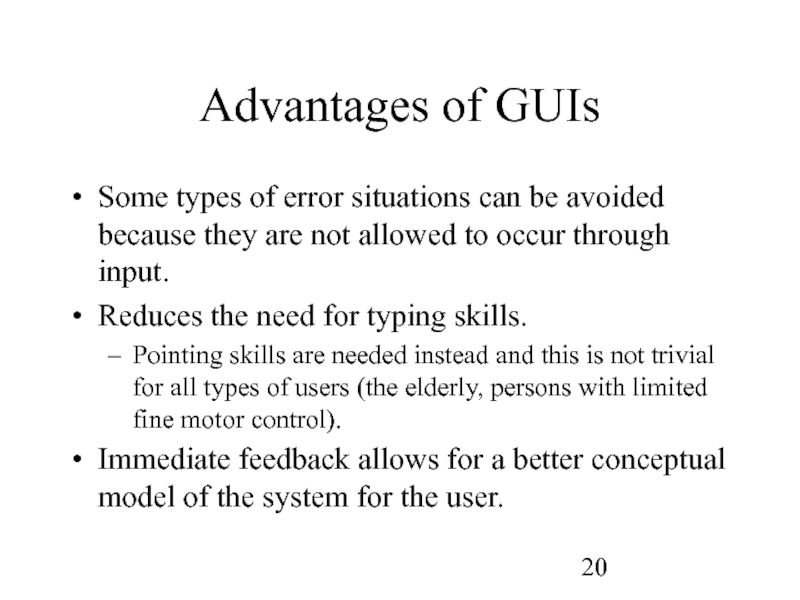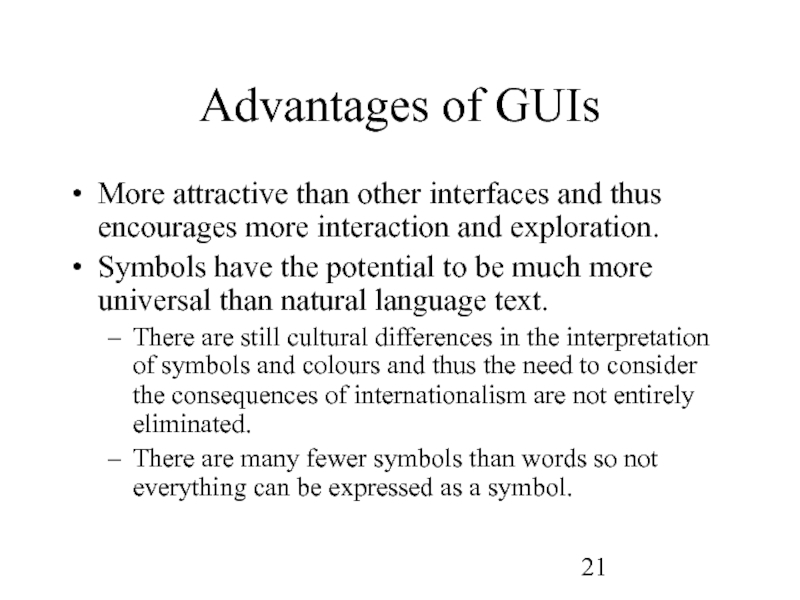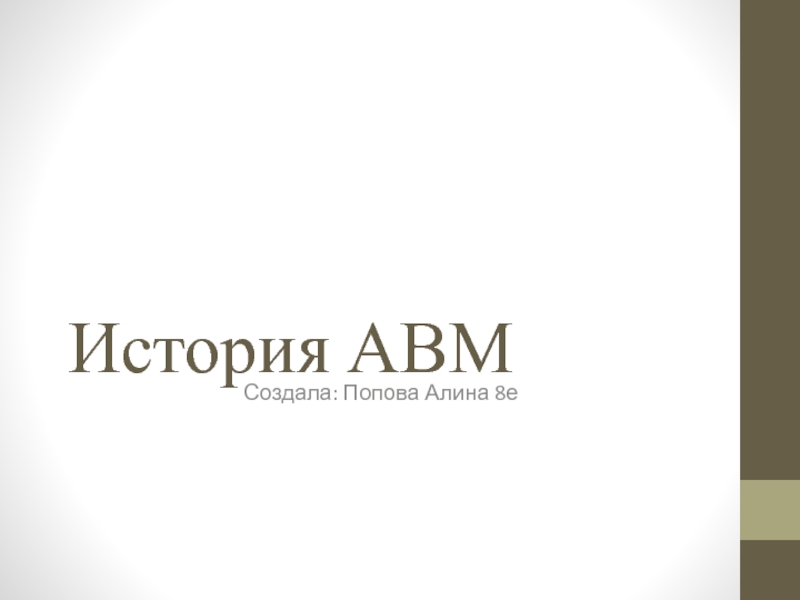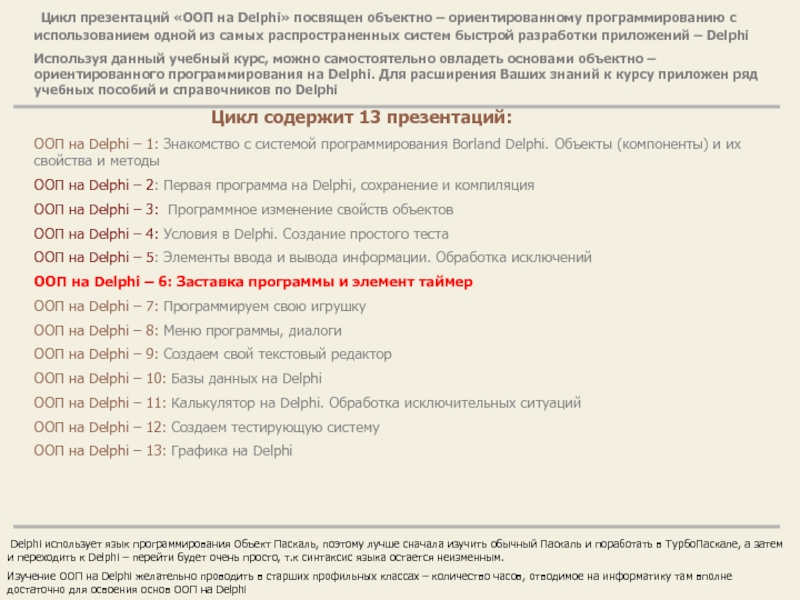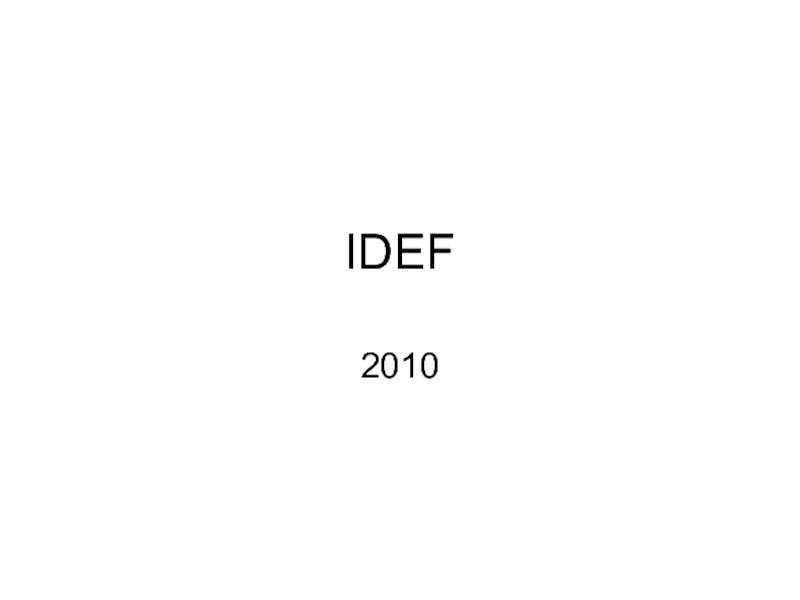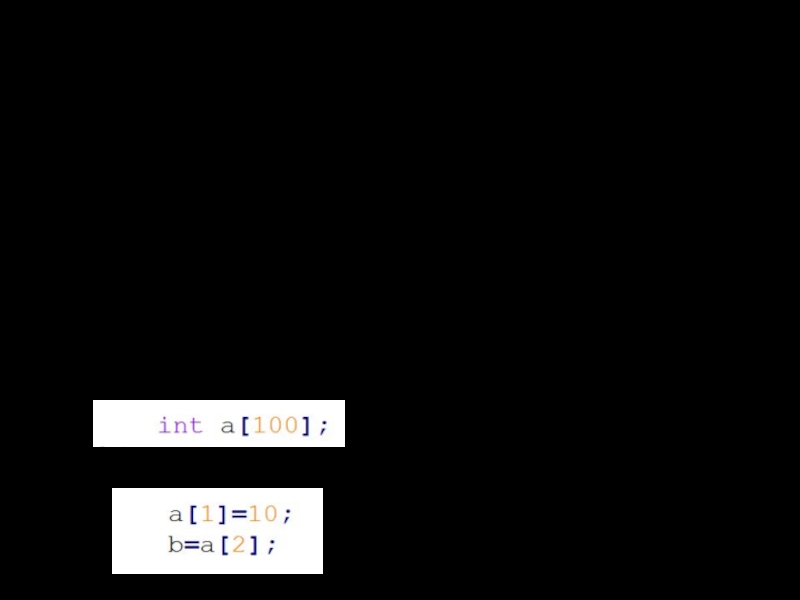- Главная
- Разное
- Дизайн
- Бизнес и предпринимательство
- Аналитика
- Образование
- Развлечения
- Красота и здоровье
- Финансы
- Государство
- Путешествия
- Спорт
- Недвижимость
- Армия
- Графика
- Культурология
- Еда и кулинария
- Лингвистика
- Английский язык
- Астрономия
- Алгебра
- Биология
- География
- Детские презентации
- Информатика
- История
- Литература
- Маркетинг
- Математика
- Медицина
- Менеджмент
- Музыка
- МХК
- Немецкий язык
- ОБЖ
- Обществознание
- Окружающий мир
- Педагогика
- Русский язык
- Технология
- Физика
- Философия
- Химия
- Шаблоны, картинки для презентаций
- Экология
- Экономика
- Юриспруденция
Graphical User Interface Design презентация
Содержание
- 1. Graphical User Interface Design
- 2. Introduction Graphics have revolutionized user
- 3. The Importance of Good Interface Design The
- 4. The Importance of Good Interface Design
- 5. A Little Bit of History The first
- 6. DEC PDP-1 Replica $120K in 1960 Paper tape
- 7. A Little Bit of History - 1970
- 8. “Hall of Fame” In the 1970's, Xerox
- 9. Xerox STAR Retailed for $16,595 in 1981
- 11. A Little Bit of History - 1980
- 12. A Little Bit of History - 1990
- 13. Now: Graphics for the masses! What enabled
- 14. Characteristics of a GUI A
- 15. Characteristics of a GUI A
- 16. Characteristics of a GUI A
- 17. Direct Manipulation Direct manipulation systems have the
- 18. Indirect Manipulation Indirect manipulation uses words and
- 19. Advantages of GUIs Symbols are easy to
- 20. Advantages of GUIs Some types of
- 21. Advantages of GUIs More attractive than
Слайд 2Introduction
Graphics have revolutionized user interface design. Properly used it
can effectively utilize a person's information processing abilities and allow for faster interaction with computer systems.
Слайд 3The Importance of Good Interface Design
The user interface may be the
only contact that the user has with the system.
the interface is the system designer's way of representing the system to the user; this is called a conceptual model
if the interface is confusing, then the user may chose not to use the system at all or will use it incorrectly
at the very least, a frustrating interface can cause stress and discomfort
a well-designed interface can increase productivity
the interface is the system designer's way of representing the system to the user; this is called a conceptual model
if the interface is confusing, then the user may chose not to use the system at all or will use it incorrectly
at the very least, a frustrating interface can cause stress and discomfort
a well-designed interface can increase productivity
Слайд 4The Importance of Good Interface Design
A study by
Tullis in 1983 showed that redesigning inquiry screens reduced decision-making time by approximately 40% which equalled a savings of 79 person-years in the system under study.
Слайд 5A Little Bit of History
The first interfaces were designed for the
convenience of the computer
keyboard input
text-based screen or paper output
human-computer dialogs styles included
command language
question and answer
menu selection
form fill-in
keyboard input
text-based screen or paper output
human-computer dialogs styles included
command language
question and answer
menu selection
form fill-in
Слайд 7A Little Bit of History - 1970
Computer graphics had appeared by
the 1960's.
Few design guidelines
Driven by hardware issues
many fields with cryptic captions
visually cluttered
user had to rely on memory for commands
ambiguous messages requiring a manual
Few design guidelines
Driven by hardware issues
many fields with cryptic captions
visually cluttered
user had to rely on memory for commands
ambiguous messages requiring a manual
Слайд 8“Hall of Fame”
In the 1970's, Xerox Labs developed Altus and STAR
and introduced mouse pointing and selecting.
Xerox never successfully marketed their advances.
Apple and its Macintosh computer introduced the graphical user interface to the mass market.
Xerox never successfully marketed their advances.
Apple and its Macintosh computer introduced the graphical user interface to the mass market.
Слайд 11A Little Bit of History - 1980
Guidelines for screen designs
Less
clutter
Less reliance on user’s memory
concepts such as grouping and alignment of elements
meaningful captions
commands listed on screen
use of function keys
clearer messages
Less reliance on user’s memory
concepts such as grouping and alignment of elements
meaningful captions
commands listed on screen
use of function keys
clearer messages
Слайд 12A Little Bit of History - 1990
Greater and more effective
use of graphics
Even less reliance on user’s memory
borders visually enhance groupings
buttons and menus replace function keys
different font sizes and types
colour
Even less reliance on user’s memory
borders visually enhance groupings
buttons and menus replace function keys
different font sizes and types
colour
Слайд 13Now: Graphics for the masses!
What enabled the sudden shift?
Chief hardware advances:
Cheap
RAM
graphics buffers are memory hogs
Success of raster graphics (vs. vector)
display (CRT) could be like cheap TV
Fast, cheap CPUs
calculations for drawing & rendering fonts
All thanks to integrated circuit technology!
graphics buffers are memory hogs
Success of raster graphics (vs. vector)
display (CRT) could be like cheap TV
Fast, cheap CPUs
calculations for drawing & rendering fonts
All thanks to integrated circuit technology!
Слайд 14Characteristics of a GUI
A user interface is a collection
of techniques and mechanisms that allow a user to interact with a system.
Graphical
primary interaction mechanism is a pointing device.
Graphical
primary interaction mechanism is a pointing device.
Слайд 15Characteristics of a GUI
A user interface is a collection
of techniques and mechanisms that allow a user to interact with a system.
Objects
the user interacts with a collection of elements called objects which are always visible to the user and are used to perform tasks.
Objects
the user interacts with a collection of elements called objects which are always visible to the user and are used to perform tasks.
Слайд 16Characteristics of a GUI
A user interface is a collection
of techniques and mechanisms that allow a user to interact with a system.
Actions
the user performs actions on objects such as accessing and modifying by pointing, selecting and manipulating.
Actions
the user performs actions on objects such as accessing and modifying by pointing, selecting and manipulating.
Слайд 17Direct Manipulation
Direct manipulation systems have the following characteristics
the system is portrayed
as an extension of the real world
there is continuous visibility of objects and actions
actions are rapid and incremental with a visible display of results
incremental actions are easily reversible
there is continuous visibility of objects and actions
actions are rapid and incremental with a visible display of results
incremental actions are easily reversible
Слайд 18Indirect Manipulation
Indirect manipulation uses words and text (typing instead of pointing)
not
all concepts can be represented graphically
space in the interface may be limited
Most GUI's are a combination of direct and indirect manipulation. When each type of manipulation should be used is still not understood entirely.
space in the interface may be limited
Most GUI's are a combination of direct and indirect manipulation. When each type of manipulation should be used is still not understood entirely.
Слайд 19Advantages of GUIs
Symbols are easy to recognize and fast to learn.
Colour
is important for classifying objects.
Symbols can aid in problem solving.
Casual users can remember symbols easier than words.
Visual and spatial cues can be utilized to provide more information in a natural way.
This, of course, excludes the visually-impaired.
Symbols can aid in problem solving.
Casual users can remember symbols easier than words.
Visual and spatial cues can be utilized to provide more information in a natural way.
This, of course, excludes the visually-impaired.
Слайд 20Advantages of GUIs
Some types of error situations can be avoided
because they are not allowed to occur through input.
Reduces the need for typing skills.
Pointing skills are needed instead and this is not trivial for all types of users (the elderly, persons with limited fine motor control).
Immediate feedback allows for a better conceptual model of the system for the user.
Reduces the need for typing skills.
Pointing skills are needed instead and this is not trivial for all types of users (the elderly, persons with limited fine motor control).
Immediate feedback allows for a better conceptual model of the system for the user.
Слайд 21Advantages of GUIs
More attractive than other interfaces and thus encourages
more interaction and exploration.
Symbols have the potential to be much more universal than natural language text.
There are still cultural differences in the interpretation of symbols and colours and thus the need to consider the consequences of internationalism are not entirely eliminated.
There are many fewer symbols than words so not everything can be expressed as a symbol.
Symbols have the potential to be much more universal than natural language text.
There are still cultural differences in the interpretation of symbols and colours and thus the need to consider the consequences of internationalism are not entirely eliminated.
There are many fewer symbols than words so not everything can be expressed as a symbol.
